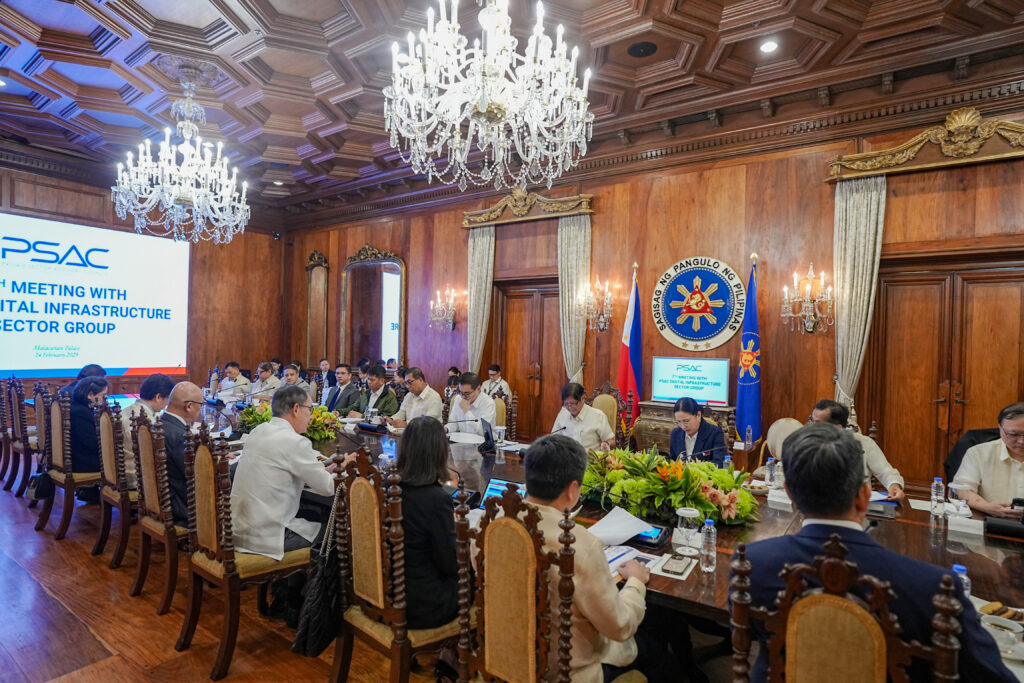|
Getting your Trinity Audio player ready...
|
In support of President Ferdinand R. Marcos Jr.’s vision for a digitally inclusive Philippines, the Private Sector Advisory Council (PSAC) – Digital Infrastructure has recommended the accelerated deployment of telecommunications infrastructure, particularly in underserved and far-flung communities. This initiative aligns with the government’s broader push to modernize the country’s digital landscape and drive inclusive economic growth.

During a recent meeting with the President, PSAC Digital Infrastructure members emphasized the need for strategic investments in connectivity to bridge the digital divide and ensure that every Filipino has access to reliable communication services. Central to this effort is the JuanSIM ng Bayan program, a strategic initiative designed to provide subsidized SIM cards and internet access to millions of Filipinos, particularly those in remote areas.
The JuanSIM ng Bayan program highlights the Marcos administration’s commitment to bridging the digital divide, particularly in schools and government offices in isolated and underserved areas. The project aims to deploy JuanSIM to 510 sites by the end of 2025, with the Department of Education (DepEd) overseeing SIM distribution. DepEd will directly coordinate with beneficiary schools, sending technical personnel for proper implementation.
The Department of Science and Technology (DOST)’s existing rural telecommunications system will support the JuanSIM initiative by leveraging existing internet connections to enhance connectivity in remote areas.
PSAC also welcomed the administration’s directive to formulate a consolidated national approach to artificial intelligence (AI) development and workforce upskilling. The council expressed full alignment with the Department of Information and Communications Technology (DICT), the Department of Science and Technology (DOST), and the National Economic and Development Authority (NEDA) on key AI-related priorities. These include investing in AI infrastructure, fostering innovation, and ensuring that Filipino workers are equipped with the necessary skills to thrive in an AI-powered economy.
Myla Villanueva, PSAC Digital Infrastructure Lead and MDI Group Holdings Inc. Chairperson, emphasized the President’s proactive approach in addressing both policy and execution challenges. “The President’s direct engagement in refining policies into practical solutions underscores the urgent need to expand bandwidth for students and families in remote areas while keeping pace with AI advancements.”
“PSAC Digital looks forward to working with DICT Secretary Ivan Uy, DOST Secretary Renato Solidum, and NEDA Chief Secretary Arsi Balisacan to develop national strategies and upskill the workforce while ensuring a balanced approach to innovation, safety, and public trust,” Villanueva said.
As the program progresses, PSAC Digital Infrastructure continues to collaborate with government agencies to roll out additional connectivity solutions, reinforcing the nation’s digital backbone. These efforts reflect a shared vision: a future where every Filipino, regardless of location or economic status, has the tools to participate and thrive in the digital economy.
About Private Sector Advisory Council
The Private Sector Advisory Council (PSAC) has been established strategically by President Ferdinand Bongbong Marcos Jr to create and strengthen innovative new synergies between the private and public sectors. PSAC comprises business leaders and experts across six main sectoral groups — Agriculture, Digital Infrastructure, Jobs, Healthcare, Build-Build-Build, and Tourism.
The Council helps the government deliver on its commitment to transform the Philippine economy by implementing robust infrastructure programs, creating more jobs and attracting more investors, digitizing processes, and improving agricultural productivity through the recalibration of micro, small and medium enterprises (MSMEs), jumpstart Philippine Tourism and ensuring an equitable, sustainable, and inclusive business landscape for Filipinos.
PSAC will continuously recommend modern policy development to the government and report regularly to the President to provide feedback and adjust recommendations based on what is happening on the ground.
Follow PSAC on X to get the latest news as it breaks.

 02-19-2026
02-19-2026 




